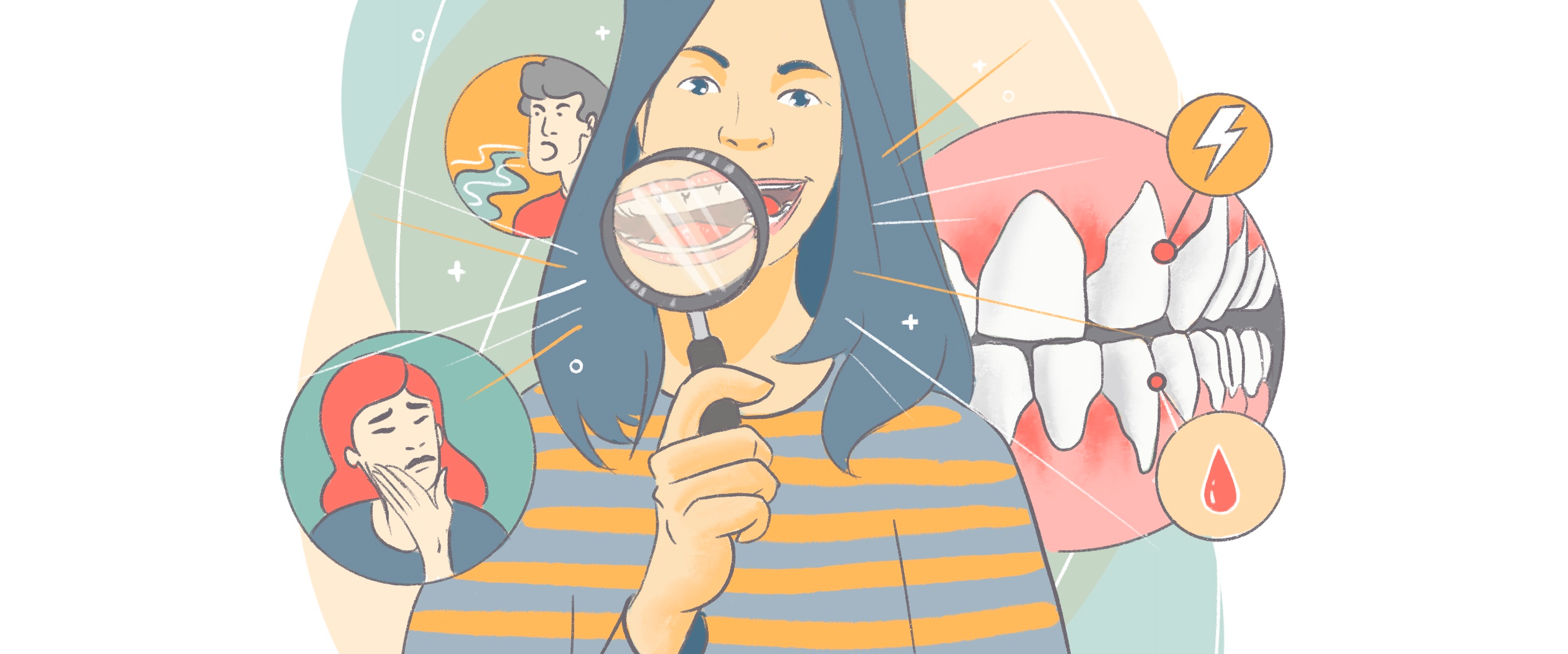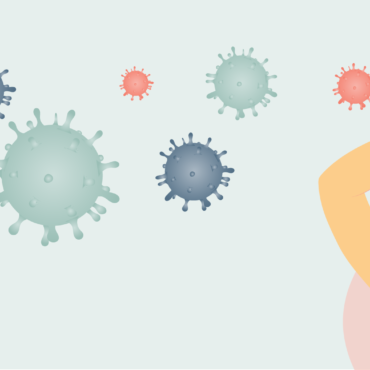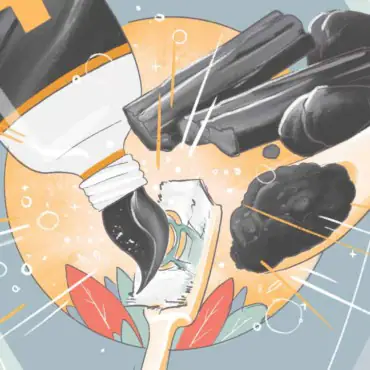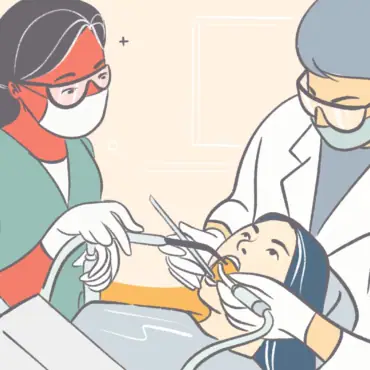When you think about your oral health, you probably focus on your teeth and gums. But your tongue plays a major role as well. It helps you talk and swallow. But it’s also home to a wide range of bacteria and other pathogens. And studies show the condition of the tongue is a primary factor in halitosis, a term that describes bad breath. Enter, tongue scraping.
Tongue scraping is a relatively simple process you can do at home. There are multiple tongue scrapers available, either online or from your local drugstore.
What are the benefits of tongue scraping?
While tongue scraping is a simple process, it holds many benefits.
- Over time, dead cells and other debris collect on the surface of the tongue. A tongue scraper helps remove this collection of materials.
- The accumulation of debris on the tongue causes a white film to cover the surface. The tongue scraper helps remove this film. Continuing to use a tongue scraper daily will also help ensure you prevent the same problem in the future.
- There are harmful bacteria that collect on the tongue, which can lead to problems like tooth decay. These bacteria also cause bad breath. In one study, it was shown a tongue scraper is effective at reducing the number of bacteria on the tongue. The study considered the effects of using a tongue scraper twice a day.
- The film that covers your tongue when there is a build-up of debris causes a reduction in your sense of taste. When a tongue scraper removes this layer, you may find your sense of taste improves.
- The mouth is a gateway to the gastrointestinal tract. Bacteria and other pathogens on your tongue can harm your health. These particles can transfer to your stomach, which can lead to infection and other illnesses. By removing pathogens from your tongue, you can greatly reduce such risks.
Give $50, get $50.
Refer someone to book a dentist with Opencare and you’ll both get $50.
How do you use a tongue scraper?
Tongue scraping is not a tedious process, and you really just need to buy one extra tool to get the job done. There are a few steps that you should follow to ensure you do not damage your tongue:
- Make sure you have the right tool for your tongue. You also need a mirror when using a tongue scraper.
- Stick your tongue out. Look in the mirror during the entire process.
- Some tongue scrapers differ from each other. Most will have a rounded side, however. The rounded side is placed flat on your tongue. Make sure you start at the backside of the tongue.
- Pull the scraper forward at a very slow pace. This is the only direction you should use, as you do not want the debris and bacteria to be pushed into your throat.
- Any debris that comes off should be removed from the scraper every time you have completed a scrape. Use a washcloth or run the scraper under the tap for this. Never put the scraper back into your mouth while there is still debris on it.
- Wash or rinse your mouth after scraping. Make sure to use soap to wash the tongue scraper. It is also advisable to wash it with warm water.
Are there side effects or risks to tongue scraping?
If you use a tongue scraper like it’s supposed to be used, the process is safe. There shouldn’t be any complications or adverse effects to worry about. For most people, however, starting out poses a somewhat difficult time.
A gag reflex is often experienced when using a tongue scraper the first few times. When the gag reflex is stimulated, it can cause discomfort. In fact, it’s possible for it to make you throw up.
If you’re too harsh with the tongue scraper, you may also damage the surface of the tongue. This can be the case when the scraper has a sharp edge, for example. Be gentle when cleaning your tongue to avoid problems. If you do accidentally damage your tongue, it may be a good idea to get a dentist appointment to ensure it heals without complication.
What is the best tongue scraper?
There are many tongue scrapers available today. Some of them are made from plastic and standard bristles. These tend to resemble the appearance of your toothbrush, just with a different shape. On the other hand, a few tongue scrapers provide different designs. Understand which tongue scrapers are better for removing debris without damaging your tongue’s surface.
Tongue scrapers usually cost less than $10 so they’re an awesome investment to make for your breath and oral health.
Tongue scrapers are typically either metal or plastic. Metal tongue scrapers are generally thought to last longer and are actually typically dishwasher-safe. Plastic ones may need to be replaced more frequently.
There are many to choose from at any local drug store, and they will do the job to keep your tongue and breath clean.
We looked at two that we would recommend if you don’t want to take a stop by a pharmacy or drug store:
HealthAndYoga Copper Tongue Cleaners
A very basic set of scrapers. There are 12 copper tongue scrapers in the package, which will help with bad breath. Smaller packs are also available.
This scraper is relatively basic but does come with handles on the sides. This makes it easier to get a good grip on the scraper. It also helps you move the scraper over your tongue.
Due for a checkup?
Find a top rated dentist near you that takes your insurance.
Other oral health routines to add in addition to tongue scraping
Tongue scraping is a great addition to your current oral health routine, but won’t prevent oral diseases on its own. Oral health is often preventative and it takes a routine to stay on top of and prevent things like cavities. Here are some other oral health best practices that you should be doing to maintain your oral hygiene:
- Brushing your teeth twice daily
- Brush for at least 2 minutes
- Flossing daily, ensuring you get between every tooth
- Mouthwash
- Avoiding sugars, coffees, and soda
- See a dentist regularly: don’t skip out on your visits every 6 months
- Drink plenty of water
- Cut out tobacco and nicotine products
Conclusion
Your tongue can be a cause of bad breath. We often do not realize just how much bacteria and other particles collect on this part of the mouth. Failure to include tongue scraping in your daily dental hygiene routine can lead to complications. When you clean your teeth, but not your tongue, pathogens still remain in your mouth. Understand the benefits of tongue scraping and learn to master the technique. Brushing and tongue scraping alone are not enough to care for your mouth. And always, look for a dentist near you to perform additional cleaning procedures at least once a year.
References
https://www.ncbi.nlm.nih.gov/pmc/articles/PMC4813452/
https://www.ncbi.nlm.nih.gov/pubmed/16032940
https://onlinelibrary.wiley.com/doi/abs/10.1111/j.0303-6979.2004.00507.x








